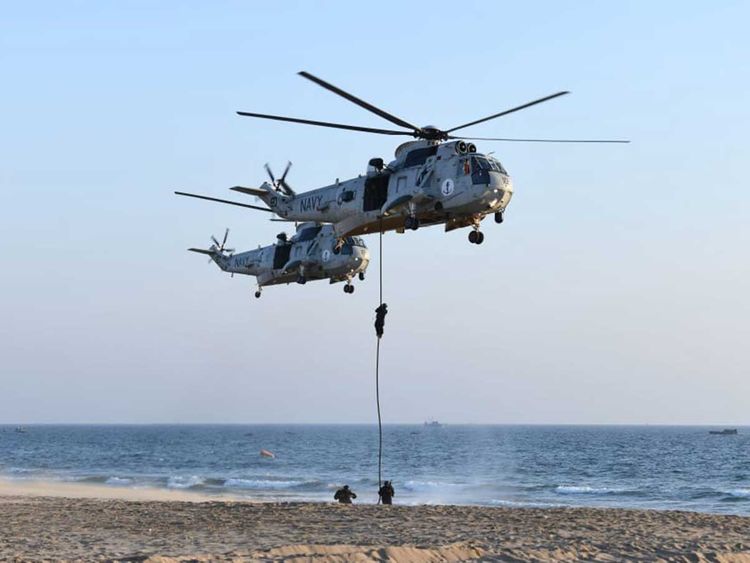Pakistan Navy embarks on Exercise AMAN – 21, first conducted in 2007, in which 28 countries participated. It is the 7th in AMAN series and has since been held biennially and regularly since then with one exception in between. It encompasses basic operational activities and procedures common to all navies and serves as great opportunity for all stakeholders to share ideas and learn from each other’s experiences. This year’s exercise will also enable participants to consolidate on what has been achieved in past years. For Pakistan Navy, it is an occasion to project the country’s image in positive light and showcase its unmistakable relevance and emergence as a potent and expanding maritime force in all dimensions of naval warfare, ready to fulfil its national responsibilities to secure its lifeline of seaborne trade on which the country is so heavily dependent.
This year, more than forty countries have so far expressed interest to participate in one or the other format of the exercise. The number of participants has been steadily increasing over the years, which is a good measure of its success. Arranging exercises on such a large scale is an expensive and logistically complex activity, and it’s possible that some countries see a favorable cost-benefit ratio in terms of valuable training experience and opt to participate for this reason alone, but nevertheless, the increasing number of participants over the years, is very encouraging and reflects a growing urge amongst maritime nations, both regional and extra-regional, to strive for new ideas for closer collaboration to grapple with contemporary challenges at sea in 21st century
The exercise is suitably structured to promote co-operation and inter-operability between regional and extra-regional navies, with area of interest and operations in Indian Ocean. The exercise concept revolves around collaborative maritime security mechanism and building partnerships amongst participants for making Indian and North Arabian Sea a safer place for sea farers and mercantile shipping. Last year, navies from Australia, China, Indonesia, Russia, Sri Lanka, Turkey, Malaysia, Maldives, and UK participated in these maneuverers.
These naval maneuvers are expected to provide building blocks for development of coalitions in the future and training opportunities in multi-layered security co-operation and promotes safe and sustainable marine environments. Presence of navies from afar provides opportunities to improve tactical interoperability between regional and extra-regional forces, which in time, could act as a bridge between the regions.
Pakistan is a peace-loving country and does not have aggressive designs against any other country. Just like land borders, there are issues at sea which relate to territorial waters, contagious zones, Exclusive Economic Zones (EEZ) and continental shelf and Pakistan is desirous to resolve them all with its neighbours in accordance with international law and expects others to reciprocate in the same spirit. Our EEZ has been extended but oceanic and geological surveys are needed before precious resources for their excavation can be allocated. Complete harmony in all such matters is desired with all stakeholders and multi-lateral naval exercises serve as an expression of such desire.
Pakistan believes in international agreements concerning use of world oceans, adherence to established guidelines for unhindered flow of trade, management of marine natural resources and is always keen to help improve maritime environments in a sustainable manner. Pakistan holds in high esteem the roles assigned by UNO to such bodies as International Maritime Organization (IMO) and International Seabed Authority (ISA) and is cognizant of its obligations towards protecting freedom of the seas, upholding legal regimes established for controlling mineral resource exploitation in deep seabed areas within and beyond national jurisdiction – embedded in the principles of common heritage for the good of all mankind.
Exercise AMAN-21 is being held at a time when regional and global geo-political milieus are changing very rapidly. In the Persian Gulf, US has recently inducted aircraft carrier USS John Stennis and its escorts to exert pressure on Iran. This deployment has happened after a gap of nearly eight months – longest in the last two decades and just when it was taken as a sign of reduced tension in the region. Now that will change. In 2016, Indian Prime Minister Narendra Modi had publicly threatened to isolate Pakistan internationally and had since been working diligently towards this end. The level of interest in Pakistan in recent past, including interest in Exercise AMAN -21, is a clear sign of his failure.
Pakistan has a significant coastline and is situated in close proximity of Persian Gulf and Gulf of Eden. It is destined to play an important role of connectivity in the Indian Ocean by virtue of its geographical location and participation in China’s ‘Belt and Road’ (BRI) initiative. CPEC has further enhanced Pakistan’s visibility in the Indian Ocean. Naval exercises at regular intervals and at this scale are needed to reinforce that perception and forge closer relations with countries which have stakes in Indian Ocean.
Pakistan, however, is not a member of Indian Ocean Rim Association (IORA) –a dynamic inter-governmental organization aimed at strengthening regional cooperation and sustainable development within the Indian Ocean Region (IOR). It has 22 full members and 9 dialogue partners who meet annually or more often, as collectively decided. Its priority and focus areas extend to a wider canvas of maritime security, trade and investment facilitation, fisheries management, disaster risk management, tourism, cultural exchanges, academics, science and technology, blue economy and women economic empowerment. While large scale naval maneuvers are of great value in their own right, IORA offers wider scope since decision making powers rests with Council of (Foreign) Ministers. As it is well known, military to military co-operation is always stronger and more reliable, if it follows political convergence of respective foreign policies and not the other way around.
Pakistan’s application for membership of IORA is lying in its secretariat since 2001 but opposed by one single country, India. Membership of IORA would help Pakistan to play a more effective and integral role in regional maritime security paradigm. As an example, US, France, Japan, Italy, and China have bases in Djibouti, situated in the horn of Africa – and all but Italy is dialogue partners in IORA, while none of these countries have an indigenous geography in Indian Ocean. Pakistan has an 1100 kilometers long coastline.
It is paradoxical that on one hand India labels Pakistan as an ‘enabler’ for facilitating China in Gwadar on the shores of Indian Ocean which it claims as its own and considers China as an outsider, but then supports China’s full access to IORA but opposes entry of ‘enabler’ Pakistan. This joke has gone on long enough and should now come to an end. Our membership case needs to be pursued vigorously with robust diplomacy to counter India’s misplaced notion about ownership of Indian Ocean. Put another way, no power on earth can stop Pakistan from playing an important role in connectivity in Indian Ocean – but can Pakistan ‘connect’ without ‘belonging’ to Indian Ocean?
Djibouti is a Muslim majority country which could make it easier for Pakistan to make inroads in the region to our advantage, through a mix of naval and conventional diplomacy, both for peace time activities and in war. China’s CPEC/BRI’s forays into African continent and its presence in Djibouti makes a good case for Pakistan to consider getting a foothold there to better secure our maritime interests. Turkey is considering to establish a base in Djibouti and there are reports of India setting up an embassy. The significance of these developments cannot be over emphasized nor can Pakistan remain oblivious to this emerging scenario.
Pakistan does not have centuries old maritime traditions like some other countries in the region and our coastal belt is scantily populated and financially stressed to support any major effort to change the economic pattern. However, a beginning can be made through enhanced awareness to use sea resources to our benefit. The advantages gained from regular AMAN series exercises, can perhaps be synergized with other elements of national power to integrate some segments of ‘Blue Economy’ in mainstream national economic endeavors. It is about time to view these new opportunities from the other direction – from Kashgar to Gwadar – and further south in the Indian Ocean where murky green coastal waters turn turquoise blue.




